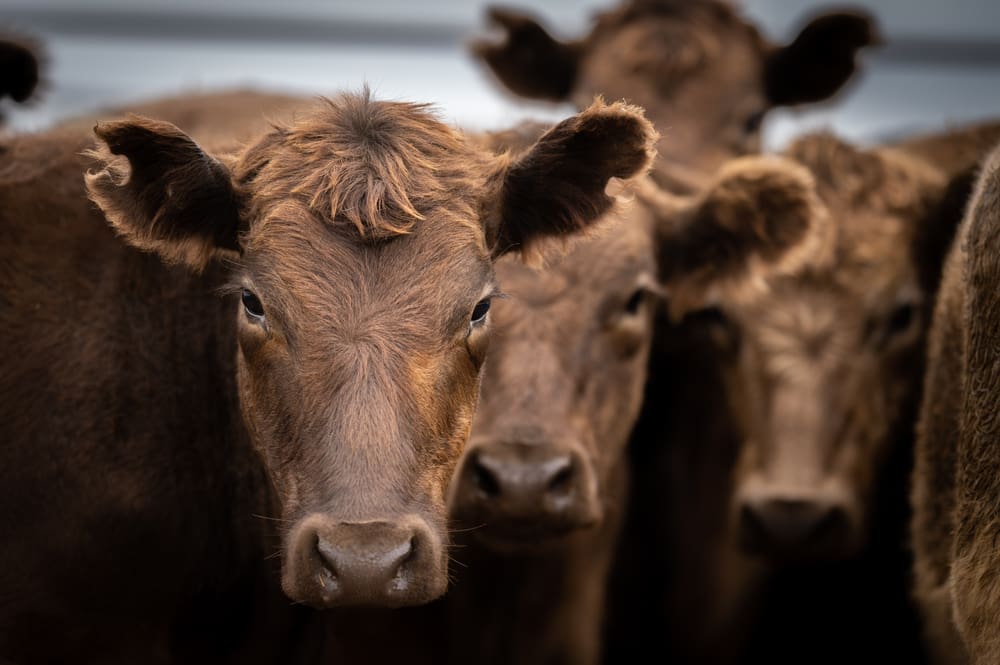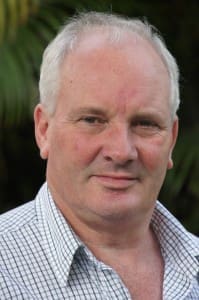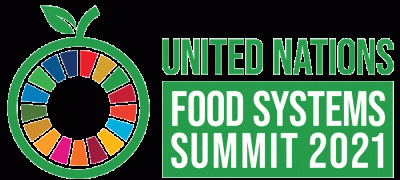
A BELATED but timely collaborative effort from various sectors of the global livestock industry helped to provide a more balanced, science-based outcome for animal agriculture than originally feared likely at the recent United Nations Food Systems Summit in New York last month.
But despite those efforts, the war against meat is intensifying, and complacency is a luxury the livestock sector can no longer afford.
 That is the view of prominent Australian red meat industry identity Rod Polkinghorne (left), who warns that greater levels of global industry collaboration are needed to ensure the science supporting the role of animal agriculture and meat consumption in healthy landscapes and healthy diets is effectively communicated.
That is the view of prominent Australian red meat industry identity Rod Polkinghorne (left), who warns that greater levels of global industry collaboration are needed to ensure the science supporting the role of animal agriculture and meat consumption in healthy landscapes and healthy diets is effectively communicated.
Mr Polkinghorne has worked with a range of scientists and industry experts this year to explore the science surrounding meat consumption and livestock production, aiming to gain a clear, evidenced based understanding of how claims by opponents to the meat industry stack up.
“Having dug and dug and dug and dug, I think the deeper you dig the more confidence you have that the science is strong – you are not going to have a world unless you have animals in it,” he said.
“A whole lot of agricultural land, around two thirds, can’t grow crops and the crops themselves are going to generate more methane or more CO2. The story (for red meat) is really positive, and we are sure as hell part of the solution.”
‘We are sure as hell part of the solution’
Mr Polkinghorne said he was motivated to start looking more deeply into the science after becoming alarmed by the degree of anti-meat rhetoric being pushed on social media and strongly influencing policy, particularly in Europe.
In the lead up to the UN Food Systems Summit on September 23, he said social media noise was deafening with the message that livestock and particularly cattle were going to destroy the planet in no time, while eating beef would cause people to die 20 years younger than they should.
Ridding the world of meat and replacing it with plant-based foods would ensure “everything would be wonderful”, was the central message.
“That was such a strong narrative and I think it was almost close to being accepted as fact,” Mr Polkinghorne said.
“If you went and talked to a 22 year old girl in London she would probably still think that.”
Belated effort by livestock sector
The UN Food Systems Summit was the culmination of 18 months of dialogue involving hundreds of countries and stakeholder groups to examine changes required to global food systems to achieve the United Nations’ 17 Sustainable Development Goals by 2030.
 Early signs raised concerns the event was set to be disproportionately influenced by anti-meat lobbyists.
Early signs raised concerns the event was set to be disproportionately influenced by anti-meat lobbyists.
The appointment of people with strong backgrounds in anti-meat activism to prominent summit roles, and pre-summit narratives advocating the adoption of EAT Lancet’s so-called “Planetary diet”, which recommends cutting meat consumption to just 14 grams per person per day, fuelled doubts about the processes’ commitment to hard science and objectivity.
“The expectation was that the UN would come out and say the whole world has to adopt the EAT Lancet diet to save the planet and that will involve meat consumption coming back essentially to nothing,” Mr Polkinghorne said.
Perhaps it was the wake up call needed to spark action but ultimately a number of industry groups and Government bodies which had been largely uninvolved engaged late in the process.
Mr Polkinghorne believes the belated efforts helped to demonstrate at UN level that there are two sides to the story.
Better than expected outcome
Ultimately the result was “more balanced than you would have dared hope three months ago”.
There was also a sense that prominent summit members driving strong anti-meat agendas, confident the process favoured their position, pushed too far in calling on hundreds of countries to eliminate meat.
“That generated a huge amount of dissent within the whole UN structure, it managed to galvanise farmers and got a lot of people thinking and talking together, and at a formal level to show that there are two sides to the story.”
Greater battles ahead
While the efforts helped the global livestock sector to dodge a bullet, many more shots lie ahead, most pressingly in the form of the Climate COP 26 conference taking place in Glasgow at the end of this month.
Mr Polkinghorne said it had been encouraging to see the industry working together on a global level, through groups such as the Global Meat Alliance, World Farmers Organisation, and the Protein PACT in the US, along with the Global Sustainable Livestock Coalition, which was formed as a direct outcome of the UN Food Systems Summit.
It was also very encouraging to see strong Australian engagement with the Department of Agriculture, Water and Environment participating in the coalition, he said.
Internatonal effort still not adequate
However, despite these efforts and the fact people are now talking internationally, Mr Polkinghorne said there is still not a “large enough, really coordinated and adequately funded effort” to match the scale of those opposing the industry.
“I think these coalitions for action could be really productive, but will require major players that are all engaged in sharing info and intel and ensuring there is an effective social media presence, that is what it is going to take.
‘I wouldn’t want anyone to get complacent’
“Short term has been better than expected because finally there has been some push back, but long term I wouldn’t want anyone to get complacent, because I think it is going to take a really strong unified global effort to try to get back on track.
“We have to have a really consistent constant message from social media down, you have to be able to compete with the opposition noise.
“We need to get the lesson that if you ignore these things for 20 years, as we have done, you’re going to get decimated.”
Warnings against complacency in the face of mounting opposing narratives have been sounded now for several years.
The 2013 article linked below is just one example, which urged the Five Nations Beef Alliance meeting that year to collaborate globally on industry communication.
Eight years later the calls continue while an extremely organised and well resourced anti-meat movement continues to build its influence over global narratives.
RELATED ARTICLE:
$1 million carrots, $450,000 burgers and free kicks for anti-meat activists

“[CCA Policy Council] considered that we are missing opportunities to demonstrate our contributions to sustainability internationally through greater alignment to the SDGs”
– Cattle Council of Australia webpage, communique August-September 2021.
???
While I can agree that we can curtail the daily intake of animal products, the absolute ideology of not consuming any is illogical.
We , as humans, derive many heath benefits of the consumption of meat, fish, eggs etc.
As humans we have done so for thousands of years.
While at the same time we must have a high degree of humanity towards them, before culling.
To put cows in sheds and feed them, goodness knows what is cruel.
We are just getting chickens out of sheds.
While some people may follow a strict vegatarian diet, that is their choice.
I abhor people who try to force others to their way of choosing.
Thankyou
Mavis Benkis.
Mavis cows go into sheds and fed whilst lying on a bed of thick sawdust and comfortable rubber mattresses. Each in their own stalls all cleaned and disinfected because they are not outside animals in the winter months. So do not think it is cruel it isn’t
Forcefully condemn clearfelling for beef cattle, and YELL OUT LOUDLY about the clear felling for CROPS. I wish I could remember the sources, but there is more carbon emissions from crops – burning, ploughing, and clearfelling – than meat animals (in Australia).
The study most quoted re. water used for beef production was from USA feedlot, not grass fed.
Meat animals are more flexible in drought + flood as food can be brought in. Crops die.
How does cotton production compared enviromentally to meat – I know many people who condemn meat production, yet
proudly wear cotton (unbleached of course).
So often the great efforts of farmers to minimise enviromental challenges are displayed to the converted – not to the general populace (forget the anti, aim for the undecided).
Sorry to rave, Pat.
Stop relying on the truth and facts they will get you nowhere in a sea of deceit. Sure facts are important as a back up. But if your going to win this war then fight to win not a draw …… You don’t want to dodge a bullet from UN recommendations it will counter attack and beat you. Start attacking plant based diets that aren’t healthy for you…. show me an old vegan…. there isn’t any. Show images for derelict factories receiving battered, leaking drums of chemicals this is the home of vegetable meat. Maybe not true but it puts the image in the peoples head…… You tell kids not to take recreational drugs at concerts because you don’t know what’s in them yet you would feed your family fake meat not knowing what the long term effect of that chemical concoction is… Hundreds of angles to change public perception of the wonderful new way to shorten your life. ….. Fight to win not to draw
What can be a more plant based product than meat produced from livestock?
Produced solely from a pasture base, processed in a package free from artificial chemicals, and in addition, sustainably and efficiently utilizing land resources not suitable for other forms of food production or uses but still need to be carefully managed.
As fourth generation cattle producers we manage the livestock in our care sustainably and are firm believers and practitioners of in the old adage – look after the land and it will look after you!
It is important to recognise that, over thousands (and more) of years, cattle, sheep, pigs and poultry have passed the scientists tests of being the most efficient and sustainable use of natural land resources to provide protein for human existence.
Otherwise the production of these animals would have ceased long ago.
A prominent economist, whom I had previously respected, suggested that Australia should consider producing kangaroos as meat.
Have you ever experienced how much a kangaroo/wallaby eats to gain so little weight?
Bit worried about consultants these days.
Even Prince Charles advocating less meat consumption (including fish surprisingly) to support saving the environment. Spent a year of my schooling with him back in ‘66, along with many other would be farmers here, obviously we didn’t have the lasting impact on him. Go after him Rod.